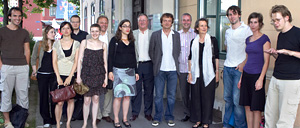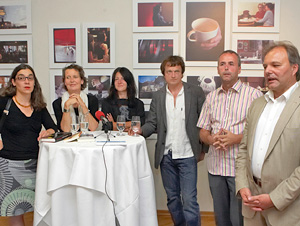
Can Literature be learned?
For the first time in the twelve year old history of the Literature Course, the tutors had the right to choose the texts themselves. The surprise is that seven of the nine stipend winners turned out to be students attending writing schools. So can literature actually be learned?
Elsewhere it’s quite normal: "Creative Writing"
In contrast to the English-speaking world, where creative writing courses have long been quite usual, in German-speaking countries so-called writing schools and creative writing programs are still the exception. While it is absolutely normal for artists to go to art school, it seems strange to many that literature can also be learned. For most people, being an author has more to do with having a special vocation than with a having a job that anyone can learn how to do.

The participants of the 12th Klagenfurt Literature Course
130 Anonymised Texts
The three tutors of this year’s Literature Course - Ferdinand Schmatz, Inka Parei und Frederike Kretzen- selected the stipend winners from a good 130 anonymised texts that had been sent in. The final result was that most of the stipend winners are attending writing schools in Leipzig and in Hildesheim.
This naturally raises the following questions. Can you “learn” how to be an author today? Is “being an author” just another job? And what effects might writing schools have on the quality of literary texts? Has literary success today become increasingly dependent upon receiving the right and possibly most “marketable” kind of education?
"Poet Factories"
Es scheint für junge Autoren immer schwieriger zu werden, nicht im "Einheitsbrei" des literarischen Marktes unterzugehen und Eigenständigkeit zu behaupten. Literarische Subversivität ist Trumpf.
For young authors, it seems to be becoming increasingly difficult not to get lost in the “uniform pulp” of the literary market and to assert their own independence. Literary subversion is the order of the day.
In the course of the last few years, the tutors have specifically learned that a certain levelling down accompanies the knowledge gained by young authors in their creative writing programs. The texts seem to lack personality. For this reason, the jury members have an ambivalent and sometimes even sceptical view of the “poet factories.”

The organizers and jury members of the Literature Course: Inka Parei, Friederike Kretzen, Moderatorin Elisabeth Heydeck, Ferdinand Schmatz, Heimo Strempfl (The Musil Museum) and the city of Klagenfurt’s councillor for cultural affairs Albert Gunzer.
"Professionalisation" detected
In any event, the advent of the writing schools and creative writing programs marks a certain “professionalisation” of authors. For the stipend winners, participating in the course especially means, in addition to having a chance to promote their own literature to a large public, being able to continue progressing in their ability to write.
“Asking literature questions” and “developing the poetic principal of texts in a sharper manner” remain the stated aims. Although the jury members are experienced poets and experts who can offer literary device, they do not, however, attempt to intervene in and regulate the texts of the young authors.
Passé: Carl Spitzweg’s "Poor Poet"
“It is difficult to say what the course of literature will be in 2008” Tendencies towards certain literary themes and styles –according to the jury members- cannot be clearly determined. What seems certain in regard to this year’s texts is that literary experiments and language games are passé
To sum things up: techniques can be learned but not writing itself. As for the young German authors of today, it will soon be necessary, once and for all, to stop associating them with the notions of the “poor poet” that the painter Carl Spitzweg certainly had in mind.
Barbara Frank